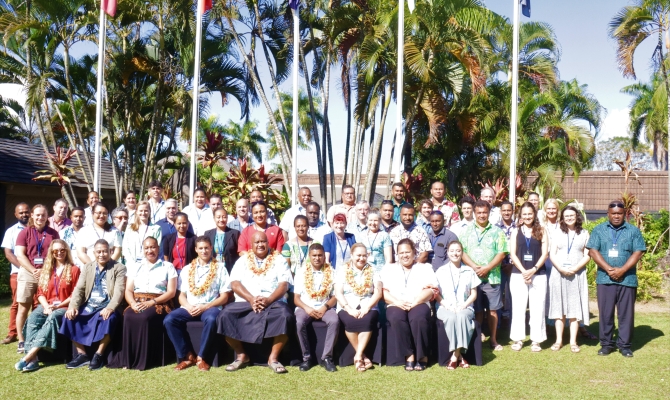Sea-level rise represents one of the most compelling consequences of climate change, as well as one of the most critical issues for Pacific Island Countries and Territories.
Government representatives, members of civil society, researchers and climate change practitioners have gathered in Fiji for a regional workshop on “Adapting Coastal Cities and Territories to Sea Level Rise in the Pacific”. Held at the Tanoa International Hotel in Nadi, from 10-12 July, workshop participants will take a deep dive into Sea Level Rise, adaptive approaches and strategies and ways to empower the Pacific in coastal adaptation planning.
The workshop is jointly organised between the Secretariat of the Pacific Regional Environment Programme (SPREP) through the Pacific Climate Change Centre (PCCC) and the Ocean & Climate Platform as part of its Sea’ties initiative.
The goal of the Sea’ties initiative is to facilitate the development of public policies and the implementation of adaptive solutions for coastal cities threatened by rising sea levels.
“The IPCC Sixth Assessment Report warns us that sea level rise is expected to cause significant impacts to small islands and combined with extreme flooding events, could threaten the future livelihoods of Pacific coastal communities”, says SPREP Director General, Sefanaia Nawadra in his opening remarks.
He further highlights the importance of a consultative approach, “beyond technical measures, adaptation solutions need to include land use planning and management, rehabilitation of coastal ecosystems that play a buffering role, planned relocation etc. All of this through targeted and effective consultations and stakeholder engagement and empowerment. Learning from each other and sharing knowledge is also important to ensure others benefit from our lessons and experiences”.
Most of the Pacific’s critical infrastructure and city centres are located in coastal areas, and therefore are exposed to the impacts of sea level rise, such as coastal erosion, water availability and quality, food production and loss of coastal and marine ecosystems. Sea level rise poses a significant threat to the Blue Pacific with the current trend of increase per year.
Government of Fiji representative, Director for the Fiji Meteorological Services, Bipen Prakash noted the importance of the workshop for the Pacific region. “Without proper adaptation measures in place, we are confirmed to face substantial risks from coastal hazards irrespective of our level of development. These are dire predictions that demand series attention globally, regionally, and nationally”.
Prakash further reaffirms the commitment of the region to respond to climate change impact, “This regional dialogue is in line with the 2050 Strategy for the Blue Pacific that reinforces commitment and working together for advancing Pacific regionalism based on the seven key thematic areas including the ocean and natural environment. This workshop further reaffirms our commitment to supporting our ongoing efforts to address the impacts of climate change, as well as our collective efforts to charter a safer and more sustainable future for the people of the Pacific.”
Participants will visit the Sigatoka Sand Dunes Park, on 12 July, together with the Fiji National Trust, to gain perspectives and experience the challenges and solutions that are implemented on the ground, with a project on sand dune ecosystem resilience funded by the Kiwa Initiative on Nature-based Solutions for Climate Change Adaptation.
Over the course of the three-day workshop, participants will increase their awareness, capacity and cooperation to support knowledge sharing in the Pacific. Workshop outcomes will produce a way forward and recommendations for the Pacific at regional and international levels, with the 28th UNFCCC Conference of the Parties being a key milestone for this advocacy work.
The Adapting Coastal Cities and Territories to Sea Level Risk in the Pacific workshop is held from 10 – 12 July 2023 in Nadi Fiji. The workshop is bringing together government representatives, practitioners, collaborating partners, researchers, and NGOs from across the Pacific Islands.
Coordinated by the Pacific Climate Change Centre and the Ocean & Climate Platform, it is supported by the Government of France through the Fonds Pacifique, the Government of Australia and the Government of New Zealand, the Ocean & Climate Platform, and the SPREP Technical Assistance through the Kiwa Initiative.
SOURCE: SPREP/PACNEWS















